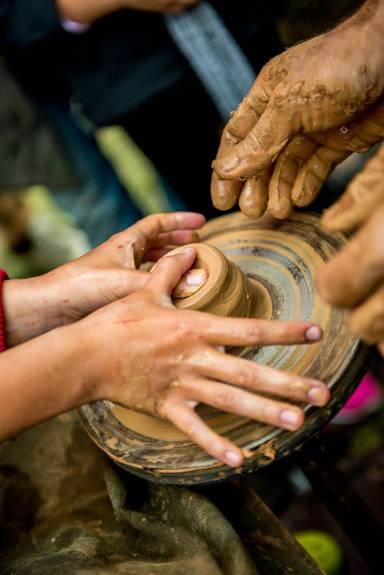10 Bagless Days : A New Dawn
10 Bagless Days: Reclaiming the Joy of Learning
Imagine a classroom where children arrive without the burden of bags, and return home filled with stories, skills, and self-discovery. Where learning is not confined to notebooks and blackboards, but spills out into the world—into gardens, workshops, museums, and minds. This is the vision behind “10 Bagless Days”—a powerful recommendation of India’s National Education Policy 2020 (NEP 2020) that seeks to reimagine learning as an experience, not a chore.
Rooted in the belief that true education engages the head, heart, and hands, the policy proposes that students across all stages of schooling must be given 10 days every year without school bags—to explore vocational crafts, community-based learning, the arts, local culture, and nature. These days are meant to awaken curiosity, build skills, foster empathy, and nurture creativity—an antidote to rote-driven schooling
Why 10 Bagless Days Matter
This is not just a pause from routine—it is a pedagogical intervention. These days offer:
Freedom to explore beyond the textbook
Experiential exposure to India’s rich artisanal and vocational heritage
Interaction with local craftsmen, community members, and real-world environments
Immersive opportunities in pottery, carpentry, gardening, weaving, storytelling, performing arts, and more
A chance to observe, reflect, collaborate, and create
At its heart, this initiative reaffirms an ancient truth: Learning happens best when we do, not just when we listen.
Rooted in Civilizational Wisdom, Aligned with Contemporary Needs
Long before the first textbook was printed, India was a land of learning. Knowledge flowed through experience—imbibed at the potter’s wheel, by the riverbanks, under the stars, in the rice fields, and amidst the sacred chants of the Gurukul.
The 10 Bagless Days rekindle this ancient Indic tradition of immersive learning, where:
- The community becomes the classroom
- The craftsman becomes the teacher
- The earth becomes the textbook
- And life becomes the lesson
These days breathe life into the Bharatiya philosophy of education—where jnana (knowledge), karma (action), and bhava (emotion) are not segregated but seamlessly integrated. This is education as lived experience—rich, rooted, and relevant.


Curriculture’s Commitment: Designing 10 Bagless Days That Matter
At Curriculture, we recognize the 10 Bagless Days not as a break, but as a sacred space to nurture joy, curiosity, and confidence in every learner. Our dedicated modules are grounded in NEP’s vision, inspired by Indian Knowledge Systems, and shaped by David Kolb’s Experiential Learning Theory—ensuring that each day is thoughtfully designed to move learners through experience, reflection, conceptualization, and application. We work closely with schools to:
Design and co-create 10 Bagless Days programs tailored to the age, location, and cultural context of their learners
Collaborate with master artisans, folk artists, environmentalists, community leaders, and experts to provide authentic, hands-on experiences
Equip educators to facilitate experiential learning—not as instructors, but as co-travelers in the learning journey
Build reflection and assessment frameworks that map growth, not grades
Our programs cover a wide spectrum—from the performing and visual arts, to indigenous crafts, culinary traditions, sustainability practices, community immersion, and more. Every day is crafted to reconnect learners with the land, local traditions, and lived experiences—bridging the gap between curriculum and community, learning and life.
What Students Experience with Curriculture
Engagement with local knowledge systems, crafts, and sustainable livelihoods
Explorations into India’s cultural and ecological heritage
Skill-building through real-life tasks—be it building a compost pit, interviewing a craftsperson, or storytelling in rural libraries
Reflection modules that tie back to identity, empathy, and purpose
From Policy to Purposeful Learning
“10 Bagless Days” is not just an event—it’s an ethos. At Curriculture, we see it as a powerful opportunity to redefine the learner’s relationship with knowledge, nature, community, and self.
By co-creating these programs with schools and community stakeholders, we ensure that each experience is contextual, culturally meaningful, and developmentally appropriate. Our programs are scalable yet personalized, ensuring that each learner carries back not just memories, but life lessons that cannot be taught—only lived.
When designed with intentionality, these days become:
A platform for local knowledge systems to reclaim their rightful space in modern education
A window for children to discover their inherent talents and inclinations
A pathway for vocational dignity, cultural pride, and community connection
A reminder that learning is not limited to the classroom, but flourishes in the world outside
Together, Let’s Make Learning Light Again
At Curriculture, we stand not just as implementers—but as educational alchemists, helping schools translate vision into vibrant, lived experiences. We believe that when learning becomes experiential, embodied, and soulful, it doesn’t just inform—it transforms.
Let us walk together to lift the weight off children’s backs and place wings on their imagination.
Let us create days that leave no imprint on the shoulders—but lifelong impressions on the soul.
Let’s reclaim the joy of learning—10 days at a time.

